It is a challenging time in many parts of the world today. Many within society are having discussions and trying to understand the complexities of our problems and the needs of the most vulnerable people. These growing discussions have been happening within Pagan and magical communities as well, empowering opportunities to further explore the issues within our circles and groups that are often underrepresented.
We are seeing an increase in focus and community support for many topics related to issues of equity, marginalization and justice. Projects, rituals, healing work, and groups have been forming in an attempt to address some of these very needs, and support solutions for the increasing number of headlines involving issues faced by minority populations today. While some of these issues in society are not new, the increased attention gained in mainstream America has brought them to the forefront.
As society seeks change and healing, we are seeing some of that manifest in our local communities, and within the Pagan community as a whole. In looking at some the work that has come forward within the community, I found amazing motivation showing that people have to be present for the needs of others. While I am sure there are many projects working to address concerns of racial injustice, police brutality, LGTBQ rights, and issues of equity, there are several new ones that stuck out.
The United Pagans of Color is a new support group forming in Southern California for people who self identify as People of Color. It is gearing up for their inaugural in-person gathering scheduled for August 1 in Long Beach, CA. Co-Founder Yvonne Conway-Williams spoke about the purpose of this forthcoming group as a way to bring support and healing within POC Pagan communities. She said, “The gatherings will allow attendees to share their personal experiences with racism, particularly within our own Pagan communities, but not exclusively. The hope is that this will bring greater awareness to each person’s plight, but also perhaps allow one another to recognize they’re not alone. From there we will work on moving toward healing ourselves as individuals as well as a community. We’d like to then take that energy out into the greater community with the hopes of healing and helping to create harmony.”
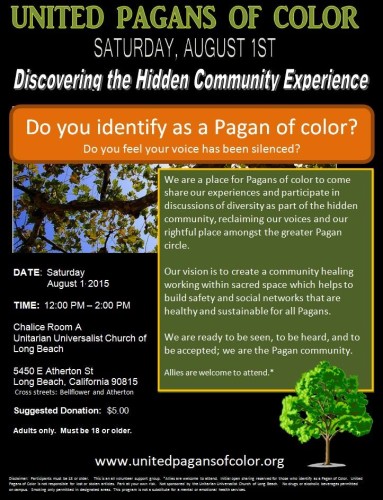
When I asked Conway about her motivations in forming this group, she spoke about her experience at PantheaCon 2015.
Back in February I attended my 10th year at Pantheacon … Sunday evening was the Pagans of Color Caucus. That event was a huge shift for me. As I rolled on up I saw a line of people out front and assumed they were waiting. When I asked if the room was still getting cleared out for the next event I was informed the line of people were there to protect the event and was immediately invited to go inside. This was a PoC only event. My husband was allowed to help me into the event, but once I was set up he had to leave. The door closed behind him and for the first time in my life I was in a room with only Pagan PoCs. I was used to being one of very few in a sea of white faces and here was a large circle of us.
One by one people shared their experiences with racism within the community. I was shocked by some of the stories, but mostly I was saddened to hear all the hurt expressed by many. When it came my turn to speak I professed disappointment about certain events in December with a large Pagan organization … and that I would be interested in putting my energy toward a project that would be helpful to the PoC community.
The next morning was a last minute gathering to allow people to convey any issues they felt about a parody schedule … At the end of this gathering those who were PoC were asked to stand in a circle with our allies circled around us as we built up energy and prepared to release the frustration, anger, hurt, and grief with a continuous collective scream. The tremendous pain in the voices from my friends circled around was so overwhelming … All I could do was cry.
My eyes were pinned open from that weekend on. The shaded veil of acceptance I had been wearing as a means to get through life was removed and every memory of racism from my childhood through to adulthood was flooding my mind. I was forced to acknowledge the impact of racism on my life and I wanted to write it out, but I wasn’t able. Instead I shut down.
Once I was ready to talk I called my friend … I told her about my experience that weekend, how I had been feeling since, and learned she’d been going through a similar intense emotional transition. I mentioned I wanted to facilitate a support group for Pagan PoCs so the two of us began working together to flesh out what would become the United Pagans of Color…
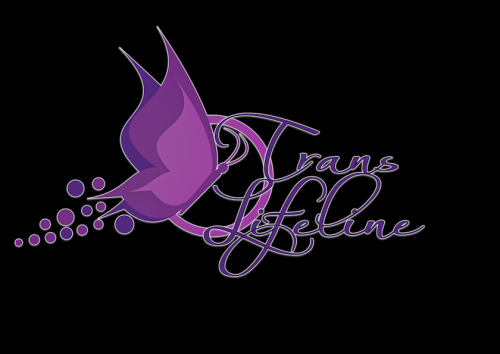
Among some of the incredible efforts of people working toward addressing the harm in our society, Trans Lifeline is one of the most needed. It was shortly before the Pagan Alliance Festival in Berkeley that I heard of the organization and the work that they were doing. I was very pleased to see them with a booth at the Pagan festival, bringing their work to the attention of local Pagan organizations.Christina A. DiEdoardo, Chairwoman of the Board for Trans Lifeline, answered some questions about the 2014 launch of this new organization.
According to the best statistics we have available–from the 2011 report “Injustice at Every Turn” by the National Gay and Lesbian Task Force and the National Center for Transgender Equality— 41 percent of Trans people will attempt suicide at least once in their lives, compared with 1.6 percent of the overall American population.
Our co-founders Greta Martela and Nina Chaubal wanted to do something about this. The genius of Greta and Nina’s concept is that it accomplishes two goals at once.Trans Lifeline trains Trans and gender-noncongruent volunteer operators … who are then empowered to serve their community by listening and supporting Trans people during the darkest hours of their lives. Callers know that they are talking to an operator who is one of their kindred and don’t need to waste time explaining what being Trans or GNC means in a situation where every second can count.
In practical terms ideally, two things happen with each successful call. First and foremost, we want the caller to be out of crisis and in a better place emotionally at the end of the call than at the beginning. Second, we hope both the caller and the operator reflect on the fact that the only reason the call is taking place is because (a) Trans people banded together to create the lifeline and (b) a Trans or GNC person gave of their time to take the call. These are examples of members of a community taking their power back for the benefit of all of their members, rather than reflections of abject powerlessness. As Trans people begin to recognize how much power we do have when we act in coalition with each other, our community’s ability to address other issues like violence against Trans Women of Color (TWOCs) will only grow.
In Sacramento, local activists Jasper James and Darcy Totten have been facilitating two new projects that are quite inspiring and community-minded. The first is a project called #altarsforjustice and the second is the facilitation of a series of “Spirituality and Social Justice” Workshops.
Darcy Totten and Jasper James
My partner Jasper and I are currently working with a dedicated group of Pagan activists to define and codify an approach to social justice activism, based in part off of Tim Titus’ Pentacle of Activism. We wanted a way to speak truth in multiple voices and disparate spaces in order to shed a light on the injustice, fear, grief, anger and the shadow work around race and racism that has been left undone for so long in this country and in many of our pagan communities.
We are holding six workshops, the end result of which we hope will be a loose framework of structured group ritual and practice that actively seeks to shift culturally embedded white supremacist ideology out of our spiritual spaces. This model creates a new way of organizing within our communities around issues of social justice using the elements as cornerstones to provide an overarching framework adaptable to any Pagan tradition.
Additionally, we have an ongoing public art project going on. Inspired by photos of [the] large Justice Altar at a recent Pagan Festival, #AltarsforJustice is a series of small shadow box altars that are, by and large, memorials to those killed by police violence and hate crimes. Initially, this project was conceived as a local one. We wanted to make space for those experiencing grief over the brutal deaths that we have been collectively experiencing in the news but had no real outlet to express our sorrow and our solidarity. Art is a powerful method of communication and I realized quickly that these altars could start to connect people around social justice issues.
For anyone looking to participate … The altars should be made and then left in a public space. They can be left in coffee shops, bus stops, on newsstands or street corners. I would characterize the work as being conceptual in nature.The idea and the execution of it are more powerful than the technique, we make them out of shoeboxes and basic arts and crafts supplies. [They] should include the name, photo, and a snippet of information of the person killed. We often include a candle and dried flowers along with a hashtag link, and information for those who might see it to find out more about the project. Once placed, we ask that you upload a photo to the Facebook page … and tweet it with the hashtag #altarsforjustice. In addition to the hashtag, we ask that you name the place you left the altar … and revisit occasionally.
It is a new project but our goal is for everyone to get involved … from different traditions, cities, towns, levels of activism and intersecting interests to make one and leave it somewhere in their own community. Our hope is to create a powerful form of group communication and community around the issues of police violence and racism in America while providing space for grief and healing in places that are accessible.
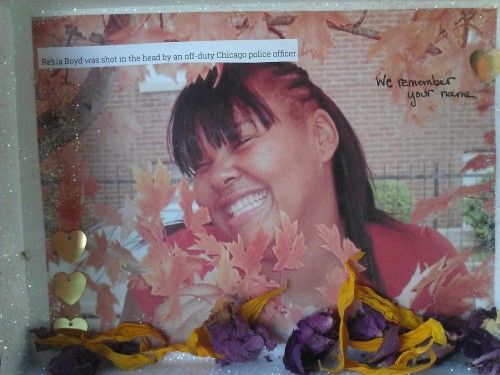
Altar for Rekia Boyd. #altarsforjustice
In June of this year four people of different magical paths came together to collaborate and facilitate a ritual for “Healing Racist Violence in our Communities.” Courtney Weber, Queen Mother Imakhu MuNeferet, Khi Armand, and Langston Kahn led this working in Brooklyn’s Catland Books. The store donated the space for the healing work, and community members joined together to bring the energy and focus. The Facebook event page described the working by immediately calling out the Charleston tragedy and the violence against Black people. It reads, “The act of terror in Charleston has injured our hearts, but it’s tragically far from an isolated act of ongoing racist violence against Black people. Please join us in the Spirit of healing this horrific epidemic in our world.” According to Weber, the rite started with adding dirt from Ferguson to the sacred bonfire “as a way to feed the Cleansing Fires.” Weber said:
We talked about the impact the violence has had on our collective psyches as of late, how we received the news of the shooting. The persons of color who attended shared their stories of experiencing racism from strangers, neighbors, classmates, even partners.
For me, there had been such pain in our community since Eric Garner’s death, but no Pagan outlet to process or release it. After Sandy and after the Boston bombing, we had success in creating space for healing. I wish it hadn’t taken the shooting to incite us to come together specifically to acknowledge the pain of racist violence on our Pagan and broader community. We hoped it would not only provide healing and stir conversation, but encourage action. It did feel as though we need more actions like this one–spaces of healing to raise energy and enact action in a Pagan context.
Kahn shared some of his experiences and reflections of the ritual:
The elements simplify things. With issues as complex as racism, the elements can be a great solace. During the ritual, Fire and Water and the stories that came up for me to share, showed me how I had silenced myself in various ways. The elements made it clear that silence was not an option. That there would never be perfect words to discuss the unspeakable.There would never be a perfect time to discuss what should never happen. I simply had to do my best to talk about my experiences and the changes I wanted to see in the world, and in myself in public ways. To find the best words I could in each moment. To not use power is also an abuse of it. I left the ritual feeling recharged. Still in pain, aware of a lot more work I had to do, but at least no longer numb. I needed the container of community ritual to truly be able to access the emotions arising in response to the madness. It was too big and overwhelming to feel alone.
The Black Witch Chronicles, a collective of three Black women practitioners, have made a strong appearance in 2015 with their Youtube video channel, blogging and magical photos. This collective of women includes Keesha Harris, Zoe Flowers and Dr. G. Love, who are all “practicing Reiki Master healer, Teachers, Diviners, and Spirit guided artists”. In speaking about this work, Dr. G. Love said, “Overall, I feel that Black Witch Chronicles is carrying a universal message of holistic integration and balance that can and does resonate across belief systems.”
Eye Candy from AfroPunk quoted the group in a May 2015 Photo Essay, saying, “In a society where the images and voices of Black womyn over the age of 40 are rarely seen or heard, we are here to reflect the wisdom, joy, and vision that our community embodies. We communicate from our collective wisdom as mothers, healers, artists, visionaries, and change makers connected to the ongoing story that sings to us from our ancestral roots.” The powerful pictures of these women in the AfroPunk piece show the incredible spark of magic, empowerment, and strong community togetherness that they present.
These women speak openly and candidly about their desire to promote healing within their communities and across spiritual paths. In asking them what they felt was their motivation to do this work, each one of them gave answers that spoke to the complexity of healing, empowerment and magic.
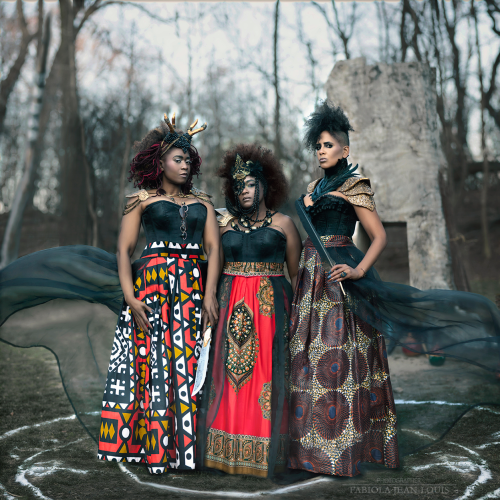
Black Witch Chronicles [Courtesy of photographer Fabiola Jean-Louis]
I believe what motivates me to do this work collectively is that I know that I can’t do this by myself. Magic is meant to be collective work. Through the human eye I may see one star shining brightly in the sky, it doesn’t mean that that star is all by itself in the cosmos. Technology has made it so that even the most solitary witch can access her people. This is, I believe, the work of Black Witch Chronicles — to make visible that which has had to be hidden for survival. To fearlessly proclaim our Black Prizmatic voice within the community of magic and within our own communities. – Keesha Harris
I’m a poet playwright and am the program mgr for the Women of Color Network a national organization dedicated to securing economic security and leadership for advocates working in the domestic violence movement. What attracted me to the group initially was the opportunity to share time, space and conversation with Dr. G. and Keesha. And now I am interested in sharing our insights with our audience and to inspire other spiritual minded individuals to step out of the shadows and embrace their true selves and to love the magickal part of themselves. – Zoe Flowers
I feel guided as a Spirit, Artist, Healer, and Black Prizmatic being to participate in the re-membering of ourselves as Whole multidimensional cosmic entities. Black Witch Chronicles is a platform for us to reflect our complexity to the larger global community that is reclaiming our birthrights as interconnected, power points in the universal grid. We are illuminating the innate power of the Divine Feminine as it expresses itself across all gender and species on Planet Earth. We believe that our reflection is a catalyst for empowerment and cultural evolution towards harmony. – Dr. G. Love
These three women continue to work as healers in their own individual practice, while also bringing work to wider audiences and sharing their power with others.
We are not only seeing this type of work with individuals and organizations, but we are also seeing some of the equity work within our communities at conventions like PantheaCon and Paganicon. The board members of Paganicon facilitated a Black Lives Matter and Cultural Appropriation panel in this year, and PantheaCon continues to support a host of programming on issues of race, equity, gender and justice related issues. The groundbreaking POC suite continues to create safe space and support at Pantheacon every year, and other supports are continuing to surface.
As greater society is faced with these grave injustices and heartbreaking realities, our modern Pagan community is learning how to come together and set intention for issues related to this specific kind of pain. As our collective spaces are continuing to work out how to address the myriad needs, emotions and layers of grief, some people are reaching out to create change through magic and by empowering others. So often people talk about wanting to do something but not knowing what to do. The magic of these new projects, and the many others not mentioned, is that they show people ways to get involved.
Change continues to happen all around us, and how we respond to these unfolding events will support us in growing into a more present, empathetic, and supportive community that promotes healing and equity. As these injustices continue to happen, it is empowering to see some of the incredible momentum of those who are rising above the pain of a grieving society to enact change.
Thank you to the organizations and individuals who’s work is highlighted in this piece, and to all those doing the similar work. This must continue.
The Wild Hunt is not responsible for links to external content.
To join a conversation on this post:
Visit our The Wild Hunt subreddit! Point your favorite browser to https://www.reddit.com/r/The_Wild_Hunt_News/, then click “JOIN”. Make sure to click the bell, too, to be notified of new articles posted to our subreddit.
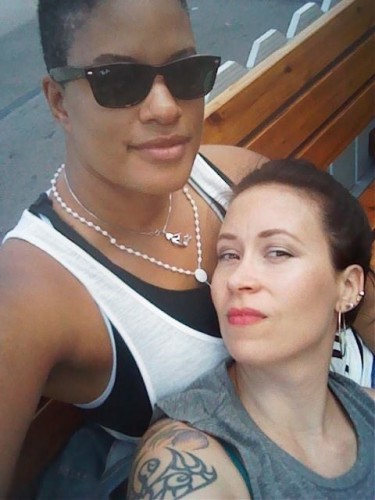
Fantastic piece. Thank you, Crystal. These groups and gatherings are so needed right now. I’m glad to see a variety of approaches reflected here.
Word.
Thank you for sharing these projects. I’m amazed at the creativity and the potential for healing. The Altars for Justice is a great example of how to answer the question “what do I do?” Thank you for all your work.
So much awesomeness highlighted here…thank all the Deities for you, Crystal, and all of the other wonderful people featured here! May their work continue, reach wider audiences, and be supported as well as welcomed by everyone in our diverse as well as difficult communities.
When we work together both magic a miracles can happen. All healing starts from the desire to heal and to be healed.
There are those that can help but most of the healing is depends on our strong desire to be healed. This may include occasionally telling the healers that they don’t know us as well as we do, as I discovered in both physical and mental illness.